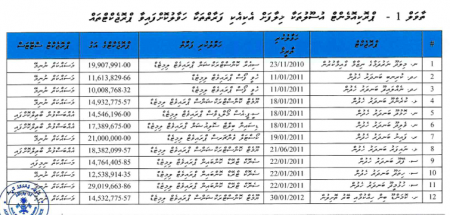Parliament passed amendments to the Public Finance Act today reversing changes brought to the law in 2010 requiring parliamentary approval for obtaining loans, providing sovereign guarantees, and leasing or selling state assets.
During the final debate at today’s sitting of the People’s Majlis, opposition Maldivian Democratic Party (MDP) MP Ibrahim Mohamed Solih said he believed the government should have “the power and discretion” to obtain loans and conduct its programmes.
However, the MDP parliamentary group leader objected to scrapping a provision in the public finance law that prohibits expenditures in excess of funds allocated in the annual budget.
If Article 34(b) is abolished, Solih said the finance minister would not have to ensure that spending was in line with the budget approved by parliament.
If MVR800 million (US$51.8 million) was allocated to the police, Solih explained that the finance minister could approve MVR1 billion (US$64.8 million) for the institution.
“The purpose of passing the budget would be completely lost if this article is abolished,” he said.
Following the debate, the government-sponsored amendments (Dhivehi) were passed with 41 votes in favour, 25 votes against, and one abstention.
While Jumhooree Party MP Hussain Mohamed proposed adding clauses to require the government to provide information concerning loans and financial assistance to parliament within 45 days, neither amendment passed after pro-government MPs voted against the proposals.
The MP for Mathiveri had argued that the current law would not hamper the daily functions of the government as a decision to take a loan or provide a sovereign guarantee would not be made “one morning at the office”.
On the issue of delays in securing parliamentary approval, Hussain noted that the economic affairs committee completed its review of the amendments in two and a half hours.
“So what is the delay here? [The amendments] will be passed today. It has probably been just a week since it was submitted,” he said, noting that pro-government MPs were in the majority.
He further urged pro-government MPs to read Majlis minutes from 2010 to see how then-opposition leaders spoke in favour of the amendments.
Progressive Party of Maldives (PPM) MP Jameel Usman meanwhile said parliament unduly assuming executive powers would pose difficulties in providing services to the public.
“Our responsibility should not be stopping things but monitoring,” he said.
Restrictive
Last week, Finance Minister Abdulla Jihad told parliament’s economic affairs committee that the government faced serious difficulties due to the requirement to seek parliamentary approval before obtaining loans.
Similar requirements did not exist in any other country, he added.
Jihad referred to a loan obtained from the Bank of Maldives during President Dr Mohamed Waheed’s administration without parliamentary approval as Majlis was in recess at the time and the funds were needed to pay salaries of government employees.
In December 2013, the Auditor General’s Office revealed that President Waheed’s administration violated finance laws in securing a domestic loan worth MVR300 million (US$ 19.45 million) from the Bank of Maldives (BML) for budget support.
Meanwhile, in May, President Abdulla Yameen suggested that the requirements of the public finance law were hampering the functioning of the executive.
The government was forced to seek parliamentary approval “even for a MVR1,000 (US$65) loan,” he said.
Yameen contended that laws imposing “various restrictions” on the executive were passed by the previous People’s Majlis due to the “irresponsibility” of the former head of government.
The passage of the amendments in 2010 prompted the en masse resignation of former President Mohamed Nasheed’s cabinet on June 29, 2010 in protest of the opposition’s alleged obstruction and “scorched earth” policy.
While former Special Majlis MP Ibrahim Ismail ‘Ibra’ characterised the amendments as the “grand finale of decimating the executive,” the Nasheed administration filed a case at the Supreme Court contesting the constitutionality of some provisions.
Yameen, who was leader of the minority opposition People’s Alliance at the time, said Nasheed’s “selling off of state assets and giving up uninhabited islands” had prompted the opposition’s actions.
“When many such actions that were harmful to the public occurred, a group of people advocating as the people’s representatives – myself included – determined things that cannot be done without a say of the parliament and passed a law called the Public Finance Act to hold the government accountable,” he had said in May.
Following the controversial transfer of power in February 2012, the new administration – made up of former opposition parties – sought to reverse the restrictions concerning the sale and lease of state properties.
Related to this story
Finance Ministry’s MVR 300 million budget-support loan “illegal”
Cabinet resigns in protest over opposition MPs “scorched earth” politics
Government hampered by “restrictive” public finance law, says President Yameen
 (0)Dislikes
(0)Dislikes (0)
(0)
